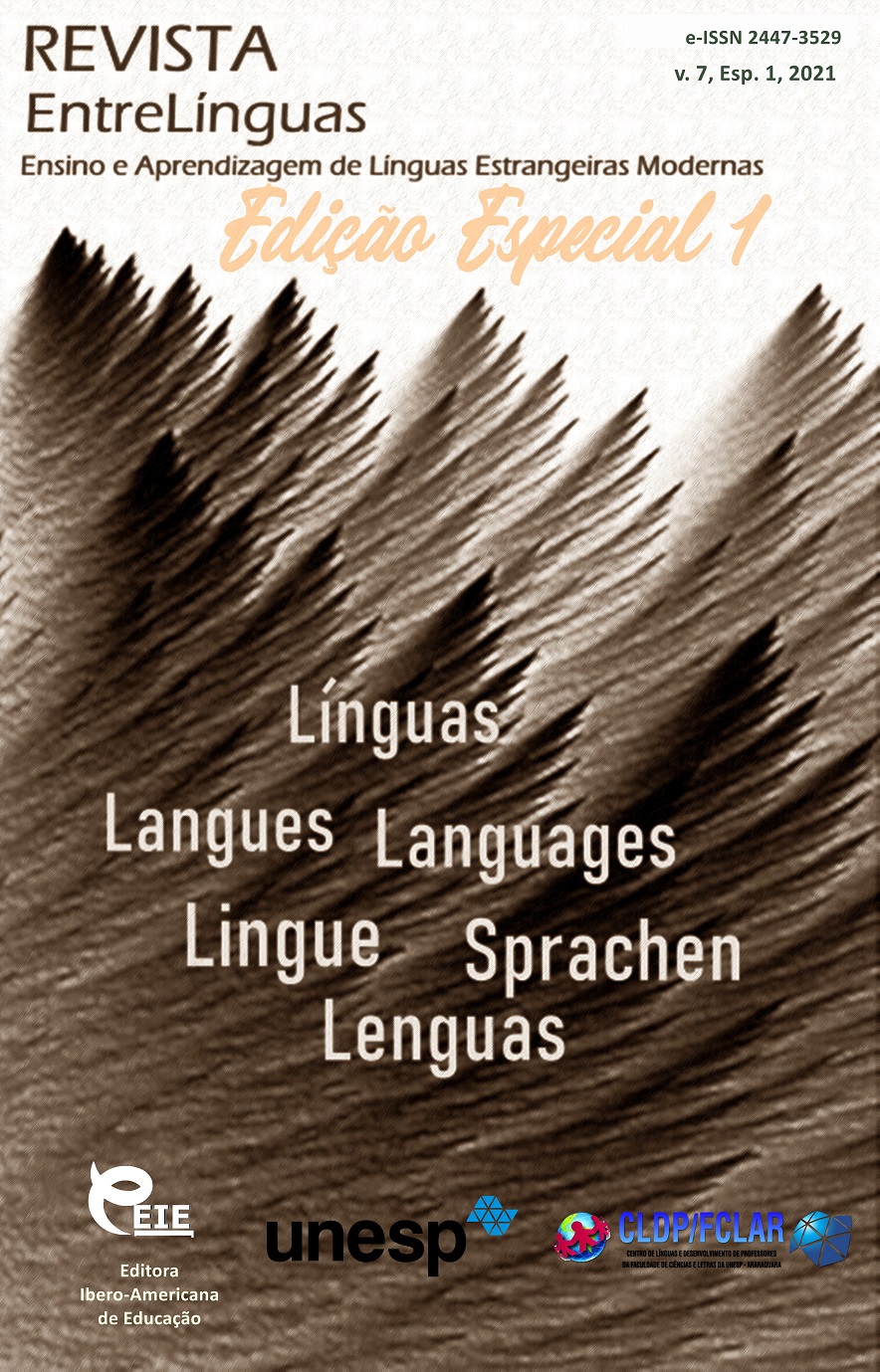Linguocultural competence as a basis for foreign language proficiency
DOI:
https://doi.org/10.29051/el.v7iEsp1.14878Keywords:
Linguoculturology, Intercultural interference, Linguistic identity, German, RussianAbstract
The article is devoted to the problem of formation of linguistic and cultural competence during foreign language classes in the middle school. The influence of intercultural interference will be significantly offset by the inclusion of linguoculturological aspects in the content of teaching foreign language, which could serve as a system of unifying values that allow us to understand the boundaries of our own linguistic identity and the identity of a native speaker’s language. The article analyzes the results of a pedagogical experiment aimed at the formation of linguoculturological competences of students in middle school. All teaching methods and techniques were oriented to stimulate the students' creative speech activity, as well as cognitive aspects, which increased the efficiency of teaching the foreign language. The authors confirmed the hypothesis that the process of teaching foreign language will be more successful if the linguoculturological aspect is included in the content of what is taught, comprising the use of linguistic and cultural information as a valuable source of linguocultural material. For that reason, the conditions for successful assimilation of knowledge, the formation and improvement of linguocultural competence in the foreign language lesson in the middle school were created. The results of a pedagogical experiment could be used in a foreign language lesson in middle school.
Downloads
References
AYUPOVA, R.; ARSENTEVA, E.; LUTFULLINA, G.; NIKULINA, E. Identifying The Key Components of Phraseological Units. Humanities & Social Sciences Reviews, v. 8, n. 1, p. 233-239, 2020.
DAVLETBAEVA, D. N.; MEIQI, L.; MINJAR-BELORUCHEVA, A. P. Linguistic Knowledge Of Russian And English Bilinguism In Educational Discourse. Modern Journal of Language Teaching Methods, v. 8, n. 10, p. 419-422, 2018.
GURYANOV, I. O.; RAKHIMOVA, A. E.; RUDNICK, A. Socio-cultural aspect of coloristic components of idioms in german discourse. QUID: Investigación, Ciencia y Tecnología, n. 1, p. 800-805, 2017.
MUKHAMADIAROVA ALBINA, F.; MERKISH NATALIYA, E.; KULKOVA MARIYA, A. The advantages of using multimedia cultural and linguistic environment in the process of teaching foreign languages. Revista Publicando, v. 5, n. 16, p. 332-339, 2018.
PLANKINA REGINA, M.; PESTOVA MARIA, S.; TARASOVA FANUZA, H.; YAKHINA ALBINA, M. Evaluative Component in the Meaning of Verbal Phraseological Units of English, Russian and Tatar Languages. Journal of Research in Applied Linguistics, v. 10, n. 2, p. 762-769, 2019.
SOLNYSHKINA, M.; KAZACHKOVA, M.; GAFIYATOVA, E.; VARLAMOVA, E. Linking words in russian social studies course books: a study on text complexity. In: INTERNATIONAL CONFERENCE ON EDUCATION, SOCIAL SCIENCES AND HUMANITIES, 4., 2018, Dubai. Proceedings […]. Dubai: SOCIOINT, 2018. p. 764-771.
TAYUPOVA, O. I. Extralinguistic Features Of Texts Nemeckij Yazyk V Bashkortostane: Problemy I Perspektivy. In: Materialy 6-j Mezhdunarodnoj nauchno-prakticheskoj konferencii. 2011. p. 194-199.
TULUSINA, E. A.; SADYKOVA, A. G.; FREDERIC, C. Determination of national specificity of perceiving the concept “learning” in german and russian through the association experiment. Astra Salvensis, v. 10, 2017.
ZHUMASHEVA, A. S.; SAMETOVA, F. T.; MUKTAROVA, E.; BATYRKHAN, B. S.; SULTANIYAZOVA, I. S. About a lingvocultural interference in the conditions of dialogue between cultures. Life Science Journal, v. 11, n. esp. 7, p. 360-364, 2014.
Downloads
Published
How to Cite
Issue
Section
License

This work is licensed under a Creative Commons Attribution-NonCommercial-ShareAlike 4.0 International License.
Os manuscritos aceitos e publicados são de propriedade da Revista EntreLínguas. Os artigos publicados e as referências citadas na Revista EntreLínguas são de inteira responsabilidade de seus autores.
Transferência de direitos autorais – autorização para publicação
Caso o artigo submetido seja aprovado para publicação, já fica acordado que o(s) autor(es) autoriza(m) a UNESP a reproduzi-lo e publicá-lo na EntreLínguas, entendendo-se os termos “reprodução” e “publicação” conforme definição respectivamente dos incisos VI e I do artigo 5° da Lei 9610/98. O artigo poderá ser acessado pela rede mundial de computadores (Internet), sendo permitidas, a título gratuito, a consulta e a reprodução de exemplar do artigo para uso próprio de quem a consulta, desde que haja a citação ao texto consultado. Essa autorização de publicação 328 EntreLínguas, Araraquara, v. 1, n .2, p. 323-328, jul./dez. 2015 não tem limitação de tempo, ficando a UNESP responsável pela manutenção da identificação do(s) autor(es) do artigo. Os artigos publicados e as referências citadas na Revista EntreLínguas são de inteira responsabilidade de seus autores.











